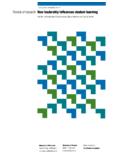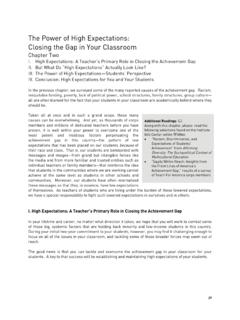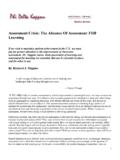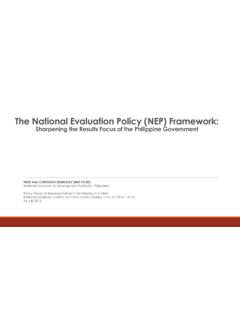Transcription of ENGLAND - OECD.org
1 ENGLAND . 1. Key Findings from the Teaching and Learning International Survey (TALIS). Effective teaching and teachers are key to ensuring that students perform to the best of their abilities. So how can countries prepare, develop and incentivise teachers to face the diverse challenges in today's schools? Engage teachers in school decisions to ensure that teachers feel valued in ENGLAND One way to help teachers feel valued is to involve them as professionals in school decisions. Although only 35% of teachers perceive their profession as being valued by society (compared with 31% on average in TALIS countries), those who report that their school provides staff with the opportunity to participate in school decisions are more than twice as likely to say that teaching is a valued profession. Deepen the content and duration of teachers' professional development activities Teachers in ENGLAND report high levels of access to professional development at nearly no cost to themselves (92% undertook professional development in the last 12 months, of which 93% paid nothing at all).
2 However, the number of days spent on professional development activities is below the TALIS average, and, although the availability of formal induction and mentoring programmes is almost universal according to headteachers in ENGLAND , teachers in ENGLAND reported lower levels of participation in professional development activities that include educational conferences or seminars, individual or collaborative research and professional qualifications. Encourage provision of meaningful feedback to improve teaching practice One way to develop teachers' teaching practice in ENGLAND might be to increase the quality of appraisals and feedback. Despite nearly all teachers in ENGLAND reporting the use of formal appraisal (99% report receiving feedback following observation of their teaching and 70% after an analysis of their students' test scores), relatively few teachers in ENGLAND are positive about the outcomes of this feedback. Indeed, compared to the TALIS average, approximately one third fewer teachers in ENGLAND say they see a moderate or large positive change in their motivation, public recognition, job satisfaction or responsibilities after they receive feedback on their work.
3 Making appraisal and feedback meaningful is especially important for teachers' feelings of self-efficacy and job satisfaction in ENGLAND . Those teachers who believe that appraisal and feedback influence their teaching also report higher job satisfaction, whereas those who feel that it is only an administrative exercise report lower self-efficacy. 1. The results presented here represent lower secondary teachers and their school leaders. ENGLAND Country Note Results from TALIS 2013. The typical teacher and headteacher in ENGLAND Typical teacher in TALIS countries Typical teacher in ENGLAND 68% are women Is 43 years old on average 63% are women Is 39 years old on average 91% completed university or other equivalent higher education 97% completed university or other equivalent higher education 90% completed a teacher education or training programme 92% completed a teacher education or training programme Has an average of 16 years of teaching experience Has an average of 12 years of teaching experience 82% are employed full time and 83% have a permanent contract 86% are employed full time and 94% have a permanent contract Teaches in a class with 24 students on average Teaches in a class with 24 students on average Typical headteacher in TALIS countries Typical headteacher in ENGLAND 51% are men Is 52 years old on average 62% are men Is 49 years old on average 96% completed university or other equivalent higher education 99% completed university or other
4 Equivalent higher education 90% completed a teacher education or training programme, 96% completed a teacher education or training programme, 85% a school administration/principal training programme 76% a school administration/principal training programme and 78% instructional leadership training and 66% instructional leadership training Has an average of 9 years of experience as a headteacher Has an average of 8 years of experience as a headteacher and 21 years of teaching experience and 25 years of teaching experience 62% are employed full time without teaching obligations 63% are employed full time without teaching obligations and 35% are employed full time with teaching obligations and 35% are employed full time with teaching obligations Works in a school with 546 students and 45 teachers on average Works in a school with 890 students and 67 teachers on average Impact of teacher feedback in ENGLAND Percentage of teachers who report a moderate or large positive change in these areas after they received feedback on their work % Average ENGLAND (United Kingdom).
5 70. 60. 50 48 49. 40. 30 30. 20. 10. 62 45 59. 0. Teaching practices Methods for teaching students with Student assessments to improve special needs student learning On average across TALIS countries and economies, many teachers report positive impacts following feedback they receive about their work, including on their classroom teaching. Compared with other countries, in ENGLAND , fewer teachers report that the feedback they received led to positive changes in their teaching practices (48%), their methods for teaching special-needs students (30%) or their use of student assessment to improve student learning (50%). 2 OECD. ENGLAND Country Note Results from TALIS 2013. Participation in professional development (PD) in ENGLAND Participation rates and average number of days for each type of professional development in the 12 months prior to the survey Teachers in ENGLAND report higher participation rates than average across TALIS countries for courses and workshops (75%) and in-service training in outside organisations (22%), but lower than average participation in more in-depth activities, such as those involving research or formal qualifications.
6 Indeed, only 1 in 10 teachers in ENGLAND reports having taken part in a qualification programme during the last year. The average number of days that teachers in ENGLAND report spending on professional development activities in the last 12 months is around half the number of days reported on average across TALIS. countries. Teachers' work in ENGLAND Teachers' reported working hours per week and distribution of time spent in the classroom during an average lesson Teachers in ENGLAND reported working more hours in the most recent calendar week than teachers on average in other TALIS countries. The great majority of teachers'. lesson time is spent teaching. On average in TALIS countries and in ENGLAND , teachers report spending around 80%. of their lesson time on actual teaching and learning. Teachers in ENGLAND report spending a slightly higher proportion of their time on administrative tasks than is the average in TALIS countries. OECD 3. ENGLAND Country Note Results from TALIS 2013. What is TALIS?
7 The Teaching and Learning International Survey (TALIS) collects internationally comparable data on the learning environment and the working conditions of teachers in schools across the world with the aim to provide valid, timely and comparable information from the perspective of practitioners in schools to help countries review and define policies for developing a high-quality teaching profession. Cross-country analysis from TALIS enables countries to identify other countries facing similar challenges and to learn from other policy approaches. Recruiting, retaining and developing teachers are vital in ensuring high-quality student outcomes in school systems worldwide. TALIS examines the ways in which teachers' work is recognised, appraised and rewarded and assesses the degree to which teachers perceive that their professional development needs are being met. The study provides insights into the beliefs and attitudes about teaching that teachers bring to the classroom and the pedagogical practices that they adopt.
8 Recognising the important role of school leadership, TALIS examines the roles of school leaders and the support that they give their teachers. Finally, TALIS examines the extent to which certain factors relate to teachers'. reports of job satisfaction and self-efficacy. Key features of the TALIS survey Who? The international target population for What? TALIS began in 2008 in 24 countries, TALIS is composed of lower secondary teachers and focusing on lower secondary education. their school leaders in mainstream public and TALIS 2013 now covers more than 30 countries private schools. In each country, a representative and economies, and although the main focus sample of 20 teachers and their school headteacher remains in lower secondary, some countries opted from 200 schools was randomly selected for the to also survey their primary schools (6 countries). study. Approximately 106 000 lower secondary and upper secondary schools (10 countries). teachers responded to the survey, representing Further, 8 countries chose to gain additional more than 4 million teachers in more than 30 insights by surveying schools that participated in participating countries and economies.
9 The 2012 Programme for International Student In ENGLAND (United Kingdom), 2 496 lower Assessment (PISA). secondary teachers and 154 headteachers from 154 schools completed the TALIS questionnaires. Separate questionnaires (paper and online) for teachers and school leaders, requiring between 45. How? A conceptual framework for TALIS was and 60 minutes to complete, were used to gather developed by subject-matter experts, the the data. They included questions on: international research consortium and the OECD teacher characteristics to steer the development of the TALIS working environments instruments. The framework is based on the leadership concept of effective teaching and learning learning and development opportunities conditions. The framework is available on the appraisal and feedback TALIS website, along with all TALIS publications pedagogical practices and beliefs and the international database. self-efficacy and job satisfaction This work is published under the responsibility of the Secretary-General of the OECD.
10 The opinions expressed and arguments employed herein do not necessarily reflect the official views of OECD member countries. This document and any map included herein are without prejudice to the status of or sovereignty over any territory, to the delimitation of international frontiers and boundaries and to the name of any territory, city or area. Contacts: Andreas Schleicher Kristen Weatherby Advisor to the Secretary-General on Senior Analyst Education Policy, Director for Education Directorate for Education and Skills and Skills Telephone: +33 6 07 38 54 64 Telephone: +33 1 45 24 13 58. For more information on the Teaching and Learning International Survey and to access the full set of TALIS 2013 results, visit.

















